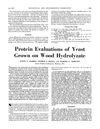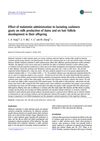Milk Protein
Research
20 / 1000+ results
research Serenoa Repens and N-Acetyl Glucosamine/Milk Proteins Complex Differentially Affect the Paracrine Communication Between Endothelial and Follicle Dermal Papilla Cells
Serenoa repens and N-acetyl glucosamine/milk proteins complex may help with hair growth and prevent hair loss.
research Prevention by Vitamin D2 in Combination with Milk Protein of Hair Loss Caused by Drugs
research Interaction of Zn(II) with Bovine Milk α-Casein: Structure-Function Study
Zinc binds to milk protein α-casein, forming stable complexes that could help fortify milk with zinc to prevent deficiencies.
research Research of Protein Grafting and Cross-Linking Technology on Pilling Resistance of Rabbit Hair Fabric
Milk protein treatment reduces pilling in rabbit hair fabric.

research Lactium: A Novel Drug for Psychocutaneous Skin Disorders
Lactium, a milk protein, can help reduce symptoms of skin disorders linked to stress and anxiety without side effects.
research Effect of Fermented Camel Milk Containing Pumpkin Seed Milk on Oxidative Stress Induced by Carbon Tetrachloride in Experimental Rats
Fermented camel milk with pumpkin seed milk reduces oxidative stress and improves health markers in rats.
research Relationship Between Amino Acid Intake and Accretion in a Marsupial, Macropus Eugenii
Amino acid levels in milk increase with protein and align with key growth stages in Macropus eugenii.

research Protein Evaluations of Yeast Grown on Wood Hydrolyzate
Yeast grown on wood sugar with added methionine could be a cheap alternative to animal protein for feed.

research Effect of Melatonin Administration to Lactating Cashmere Goats on Milk Production of Dams and Hair Follicle Development in Their Offspring
Melatonin increases cashmere quality in goats but reduces their milk production and doesn't affect their offspring's hair growth.

research Linking Diet to Acne Metabolomics, Inflammation, and Comedogenesis: An Update
Eating less sugar, milk, and saturated fats and more vegetables and fish may help treat and prevent acne.
research Protective Effect of Conditioner Agents on Hair Treated with Oxidative Hair Dye
Conditioners in hair dye reduce damage and improve combability.

research A Review of Literature on Rice Water for Hair Mask
The rice water hair mask effectively moisturizes, strengthens, and protects hair.
research Expression of the Guinea Pig Alpha-Lactalbumin Gene in Transgenic Mice
The guinea pig α-lactalbumin gene was successfully expressed in the mammary glands of transgenic mice.

research Efficacy of Oral Vitamin D3 Therapy in Patients Suffering from Diffuse Hair Loss (Telogen Effluvium)
Taking vitamin D3 pills helped improve hair growth in women with a certain type of hair loss.

research Role of Allergy in the Development of Alopecia Areata
Food allergies may contribute to alopecia areata, and avoiding specific allergens can help hair regrowth.

research Comparison of Three Different Lactic Acid Bacteria-Fermented Proteins on RAW 264.7 Osteoclast and MC3T3-E1 Osteoblast Differentiation
Fermented soy protein may help prevent bone loss by affecting bone cell activity.

research Effects of Zinc Supplementation on Milk Production Performance and Growth Status of Bactrian Camels
Zinc supplements improve hair growth in camels and support growth and hair development in calves.
research Role of Insulin, Insulin-Like Growth Factor-1, Hyperglycemic Food, and Milk Consumption in the Pathogenesis of Acne Vulgaris
Eating high-glycemic foods and drinking milk may worsen acne by increasing insulin and IGF-1 levels.
research Biotechnology of Functional Proteins and Peptides for Hair Cosmetic Formulations
Future hair products will use ecofriendly proteins and peptides to improve hair health and appearance.
research Analysis of Potentially Toxic Contaminants in Milk Powder
Milk powder in Romania often has unsafe levels of aluminum and other elements, posing health risks.